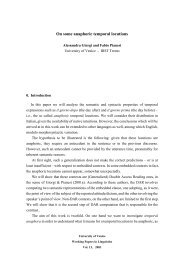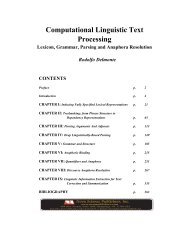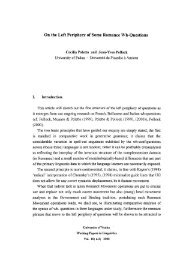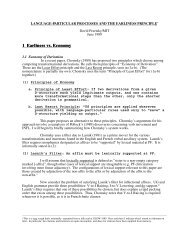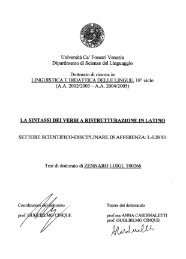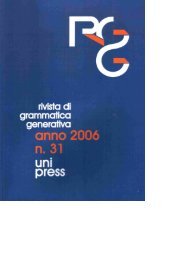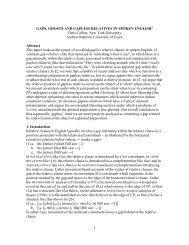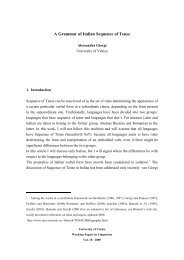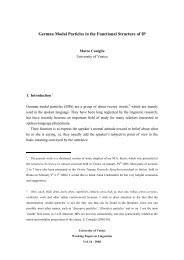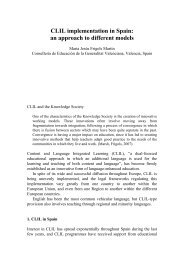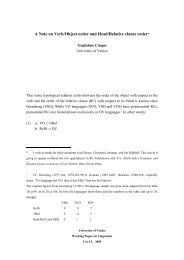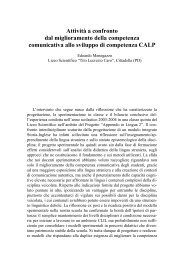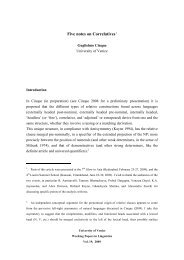Chinese relative clauses: restrictive, descriptive or appositive? - Lear
Chinese relative clauses: restrictive, descriptive or appositive? - Lear
Chinese relative clauses: restrictive, descriptive or appositive? - Lear
You also want an ePaper? Increase the reach of your titles
YUMPU automatically turns print PDFs into web optimized ePapers that Google loves.
FRANCESCA DEL GOBBO<br />
the noun they modify: <strong>appositive</strong> adjectives can modify pronouns and proper<br />
names, <strong>restrictive</strong> <strong>relative</strong> <strong>clauses</strong> cannot. Syntactically they are then very<br />
similar; semantically, we need to assume a different mechanism of<br />
composition. In Del Gobbo (2004), I propose that when a predicate of<br />
individuals (type ), modifies a singular term (type e), it simply<br />
intersects with the singleton set f<strong>or</strong>med from the denotation of the latter. The<br />
structure is acceptable if the predicate denoted by the <strong>relative</strong> is true of the<br />
individual denoted by the DP.<br />
6. Where do <strong>Chinese</strong> <strong>relative</strong> <strong>clauses</strong> stand?<br />
Once we establish that there is a syntactic and semantic similarity between<br />
<strong>appositive</strong> adjectives and <strong>restrictive</strong> <strong>relative</strong> <strong>clauses</strong>, we can explain the<br />
behavi<strong>or</strong> of the <strong>Chinese</strong> sentences seen in section 4. Those <strong>relative</strong> <strong>clauses</strong><br />
are predicates of individuals that modify proper names <strong>or</strong> pronouns, namely<br />
singular terms (type e). This means that, f<strong>or</strong> reasons that remain to be<br />
investigated th<strong>or</strong>oughly, <strong>relative</strong> <strong>clauses</strong> in <strong>Chinese</strong>, differently from <strong>relative</strong><br />
<strong>clauses</strong> in English, have the potential to behave like <strong>appositive</strong> adjectives of<br />
English: in other w<strong>or</strong>ds, they are m<strong>or</strong>e ‘adjectival’ than English <strong>relative</strong>s.<br />
Namely, they can modify nominals that denote individuals (type e), without<br />
detaching themselves from the same nominals like real <strong>appositive</strong>s do. This<br />
explains why pronouns and anaph<strong>or</strong>s inside these <strong>relative</strong>s are always in the<br />
scope of elements within the matrix clause. It also explains why sentential<br />
adverbs of modification yield ungrammaticality if added to <strong>Chinese</strong> <strong>relative</strong><br />
<strong>clauses</strong>: this is so because these adverbs need to be part of a main assertion,<br />
and not of a predicate. 8<br />
In sum, <strong>Chinese</strong> <strong>relative</strong> <strong>clauses</strong> are either <strong>restrictive</strong> <strong>relative</strong>s <strong>or</strong><br />
<strong>appositive</strong> adjectives. By this I mean that they always denote predicates of<br />
individuals (type ), and that they are always adjoined to the noun they<br />
modify, at all levels. What they cannot do is being real <strong>appositive</strong> <strong>relative</strong><br />
<strong>clauses</strong>, namely propositions (type t) that detach from the matrix at some<br />
relevant level, certainly at LF, most probably also at the discourse level.<br />
8<br />
As f<strong>or</strong> the reasons why <strong>appositive</strong>s cannot modify quantified heads, I refer the reader to my<br />
dissertation, Del Gobbo (2003).<br />
302



